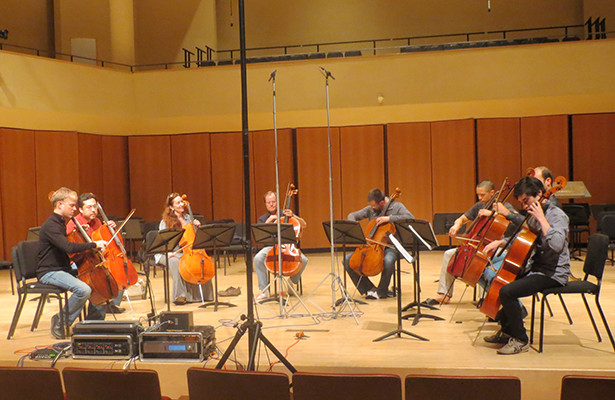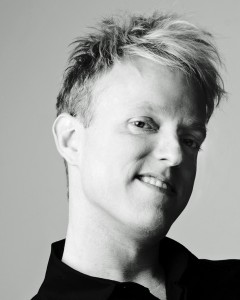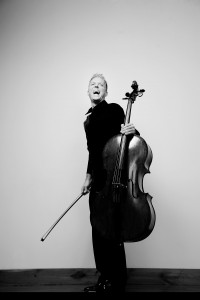This article is part of a series centered around the members and work of the Northwestern University Cello Ensemble.
Principal cellist of the Toronto Symphony Orchestra, Joseph Johnson has been heard throughout the world as a soloist, chamber musician and educator. A graduate of the Eastman School of Music, Joseph Johnson earned his master’s degree from Northwestern University. As a featured soloist on the Shadow, Echo, Memory album (which will be released by Sono Luminus on July 29), he took the time to answer some questions of ours and share some of his thoughts about his life as a musician.

Q. Is there something in particular that makes the cello special to you?
A. The cello has the same range as the human voice, from a bass to a soprano. It’s a very sonorous, soulful instrument.
Q. Outside of playing the cello, what are some of your interests?
A. I like being outdoors – hiking in the mountains, scuba diving and snorkeling. Anyplace with wide open spaces.
Q. Do you have a favourite composer or piece of music?
A. Richard Strauss, Beethoven and Bartok String Quartets.
Q. How do you juggle practicing, performing, rehearsing, and everyday life?
A. It’s tricky. You have to prioritize and manage your schedule. Knowing what pieces are coming up that you need to practice, plus having enough time for your students and home life. Sometimes there just isn’t enough time!

Q. If you have very limited practice time, how would you approach your practice? What things are essential to you for effective work?
A. You have to make the time. My favorite time to practice is after an orchestra concert, around 10:00. Everyone else has left the building. I’ve just played a two hour concert, so I’m warmed up, the brain is on, and I can really focus for another couple hours and get a lot done.
Q. Being an alumnus of the Bienen School of Music, you have returned to Northwestern multiple times as a teacher, performer, and recording artist. How does it feel to come back to your alma mater in these capacities?
A. I love coming back to Northwestern and seeing how the students have progressed in the studio that I already know. And, it’s great to meet the newer people. Of course, it’s always wonderful to see Hans. It always feels a little trippy because I have so many memories there. It makes me feel like I’m still part of a huge, wonderful family, and I’m coming home.
Q. You are featured on the CD as the soloist on Rachmaninoff’s “Vocalise”. What are your thoughts regarding the piece, and what was the recording process like?
A. Vocalise is the ultimate exercise in expressive, legato, long-line playing. Recording this was so much fun, because the arrangement is spectacular, and I was playing with some amazing colleagues from all over. Everyone was prepared and supportive of each other. I remember there were many current students sitting out in the audience, so it felt more like a performance.
Q. You have established a highly successful career and reputation as an orchestral musician, soloist, chamber musician, and teacher. In your experience, what different rewards and challenges do you find in each, and how much overlap is there between these pursuits?

A. I feel very lucky in the fact that my musical life is so varied. I get to experience playing great orchestra music at the highest level, while also having the time to play a lot of solo concerts and chamber music. The older I get, the more I absolutely love teaching, which is something I thought would never happen when I was younger. I love seeing students improve, have breakthroughs, go on to win jobs and contribute to the music world. Most of my happiest memories aren’t about concerts I’ve given, but about moments when a student comes back to me with great news, or plays a great concert, or graduates.
Q. Describe Prof. Jensen, his teaching, and your experience with him through the years.
A. Hans was and still is a wonderful teacher for me. When I came to Northwestern for grad school, he really pushed me hard, but also gave me the freedom to develop on my own. After I won my first job, I still came back to Hans for years afterward to play for him, and it was like I was still in school. We would have crazy two, three-hour lessons, he’d scream at me, I’d scream at him, it would get super intense (in the best way), we’d end up laughing and collapsing in exhaustion, have dinner, and I would go back home feeling amazing. Hans accompanied me to Moscow for almost three weeks for the Tchaikovsky Competition in 2002. I could write a book on our experiences. Use your imagination. He is incredibly giving, thinks only of his students, and I know I am so lucky to be a part of the Hans family.
Q. If you weren’t a musician, what would you like to do for a living?
A. Play in the NBA.
Q. Do you have any advice for aspiring young cellists?
A. Practice, but don’t only practice. Get out of the house and go do things. LIVE. If you have no life experiences, you have nothing to offer as a musician or performer. Go travel, fall in love, get your heart broken, take chances, and practice like crazy as well.
The Northwestern University Cello Ensemble is currently working on their album Shadow, Echo, Memory, which will be released by Sono Luminus on July 29. Please enjoy this sneak peek below, and be sure to become a fan on Facebook and follow them on Twitter.














I can relate to the challenges discussed here, and I appreciate your insights.